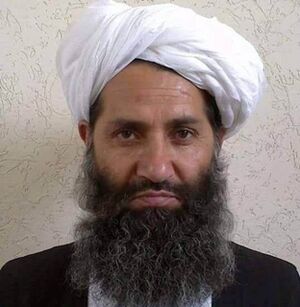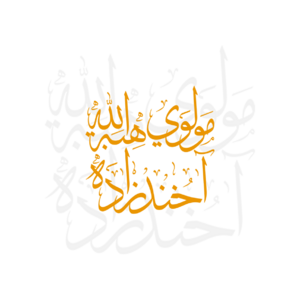Hibatullah Akhundzada facts for kids
Quick facts for kids
Hibatullah Akhundzada
|
|
|---|---|
|
هبت الله اخوندزادہ
|
|

A passport photo of Akhundzada from 1990, according to the Taliban.
|
|
| Supreme Leader of Afghanistan | |
| Assumed office 15 August 2021 |
|
| Prime Minister | Hasan Akhund (acting) |
| Deputy |
|
| Preceded by | Ashraf Ghani (as President) |
| In exile 25 May 2016 – 15 August 2021 Acting: 21–25 May 2016 |
|
| Deputy |
|
| Preceded by | Akhtar Mansour |
| First Deputy Leader of the Islamic Emirate of Afghanistan | |
| In exile 29 July 2015 – 25 May 2016 |
|
| Supreme Leader | Akhtar Mansour |
| Preceded by | Akhtar Mansour |
| Succeeded by | Sirajuddin Haqqani |
| Chief Justice of the Islamic Emirate of Afghanistan | |
| In exile c. 2001 – 25 May 2016 |
|
| Supreme Leader |
|
| Preceded by | Noor Mohammad Saqib |
| Succeeded by | Abdul Hakim Haqqani |
| Head of the Eastern Zone Military Court | |
| In office c. 1996 – c. 2001 |
|
| Supreme Leader | Mullah Omar |
| Head of the Military Court of Kabul | |
| In office c. 1995 – c. 2001 |
|
| Supreme Leader | Mullah Omar |
| Personal details | |
| Born | 19 October 1967 Panjwayi District, Kandahar Province, Kingdom of Afghanistan |
| Residence | Kandahar |
| Ethnicity | Pashtun |
| Tribe | Durrani (Abdali) |
| Political affiliation | Taliban |
| Military service | |
| Allegiance |
|
| Branch/service |
|
| Battles/wars |
|
| Religion | Islam |
| Denomination | Sunni |
Hibatullah Akhundzada is a religious and political leader from Afghanistan. He is the supreme leader of Afghanistan and the head of the Taliban. He has led the Taliban since 2016. In 2021, his group took control of Afghanistan after a long war.
Akhundzada is a very private person. He is rarely seen in public, and there is only one unconfirmed photo of him. He is known for making important religious rulings, called fatwas, for the Taliban. He was an Islamic judge for the Taliban government in the 1990s. Unlike many other Taliban leaders, he was not a military commander.
In 2021, Akhundzada led the Taliban to victory and became the ruler of Afghanistan. His government has been criticized for its strict rules. These rules have limited the rights of people, especially women and girls. For example, most teenage girls are not allowed to go to high school. In July 2025, the International Criminal Court issued arrest warrants for him. The court accused him of persecuting women and girls in Afghanistan.
Contents
Early Life and Family
Hibatullah Akhundzada was born on 19 October 1967, in a village in Kandahar Province, Afghanistan. His first name, Hibatullah, means "gift from God" in Arabic. His father was a religious scholar and the prayer leader at a local mosque. His family was not wealthy and lived on payments from the community.
When the Soviet Union invaded Afghanistan in 1979, his family moved to Quetta, Pakistan. There, Akhundzada studied at a religious school, called a madrassa. In the 1980s, he joined the resistance against the Soviet army.
After the U.S. invasion in 2001, Akhundzada went back to Pakistan. He became an important teacher and an expert in Islamic law. He taught many Taliban members in Quetta. He reportedly does not use modern technology like smartphones and communicates through letters. He is said to have two wives and eleven children. Since taking power, he has lived and ruled from the city of Kandahar.
His Role in the Taliban
Akhundzada joined the Taliban in 1994, near the beginning of the movement. He worked in several roles, including as a judge in the Taliban's military courts. He also taught at a religious school in Kandahar that was important to the Taliban's founder, Mullah Omar.
Becoming a Leader
After the Taliban government was removed in 2001, Akhundzada became the head of the group's council of religious scholars. He was a trusted advisor to the Taliban's top leaders, Mullah Omar and Akhtar Mansour. He was known for his knowledge of Islamic law and for making important religious decisions.
In 2015, he was named one of two deputy leaders of the Taliban. When the supreme leader, Akhtar Mansour, was killed in a U.S. drone strike in 2016, Akhundzada was chosen to replace him. This was a surprise to some, but he was seen as a good compromise choice. Sirajuddin Haqqani and Mullah Yaqoob, the son of Mullah Omar, became his deputies.
Attempts on His Life
There have been at least three attempts to assassinate Akhundzada. In 2012, a man tried to shoot him during a lecture in Quetta, but the gun failed to fire.
In August 2019, a bomb exploded in a mosque in Pakistan where Akhundzada used to teach. His younger brother and father were killed in the blast. A group that broke away from the Taliban said they were responsible and that Akhundzada was the real target.
In May 2024, another group claimed they tried to attack Akhundzada in Kabul. They said he escaped, but some of his guards were killed. The Taliban did not comment on this report.
Supreme Leader of Afghanistan
In August 2021, the Taliban took control of Afghanistan's capital, Kabul, as U.S. forces were leaving the country. This made Akhundzada the new ruler of Afghanistan. He ordered the release of political prisoners from jails across the country.
For a long time after the Taliban took power, no one saw Akhundzada in public. This led to rumors that he might not be alive. The Taliban denied these rumors. In October 2021, they said he visited a school in Kandahar, but no photos or videos were released.
He has made a few rare public appearances since then. In April 2022, he gave a speech at a mosque in Kandahar for the holiday of Eid. In July 2022, he spoke at a large meeting of religious leaders in Kabul. He has met with a foreign official only once, when he had a secret meeting with the prime minister of Qatar in May 2023.
New Rules and Policies
As leader, Akhundzada has issued many decrees, or official orders, based on his strict interpretation of Sharia (Islamic law).
- Women's Rights: In December 2021, he issued a decree about women's rights. It said women must agree to marriage and cannot be treated as property. However, other rules have been much more restrictive.
- Dress Code: In May 2022, he approved a decree that requires women to cover themselves from head to toe in public. The recommended covering is the burqa.
- Education: His government has stopped most teenage girls from attending secondary school.
- Punishments: In November 2022, he ordered judges to enforce strict punishments like public flogging (whipping) and amputations for certain crimes.
- Criticism: He has also banned people from criticizing the government or its officials.
These policies have caused concern around the world and have created disagreements within the Taliban itself. Some Taliban officials in Kabul have to deal with international criticism and believe the rules are too harsh.
Political Beliefs
Hibatullah Akhundzada is known for his very conservative religious views. He believes that Afghanistan should be governed by a pure form of Islamic law. He has said that he will not compromise on his beliefs to please other countries.
In a speech in July 2022, he told a gathering of religious leaders that the international community was interfering in Afghanistan. He said he was not there to follow the wishes of foreigners. He also said that his government would not be scared by threats. His strict policies and leadership style have caused tension between his advisors in Kandahar and government officials in Kabul.
See also
 In Spanish: Haibatulá Ajundzadá para niños
In Spanish: Haibatulá Ajundzadá para niños
 | Lonnie Johnson |
 | Granville Woods |
 | Lewis Howard Latimer |
 | James West |


